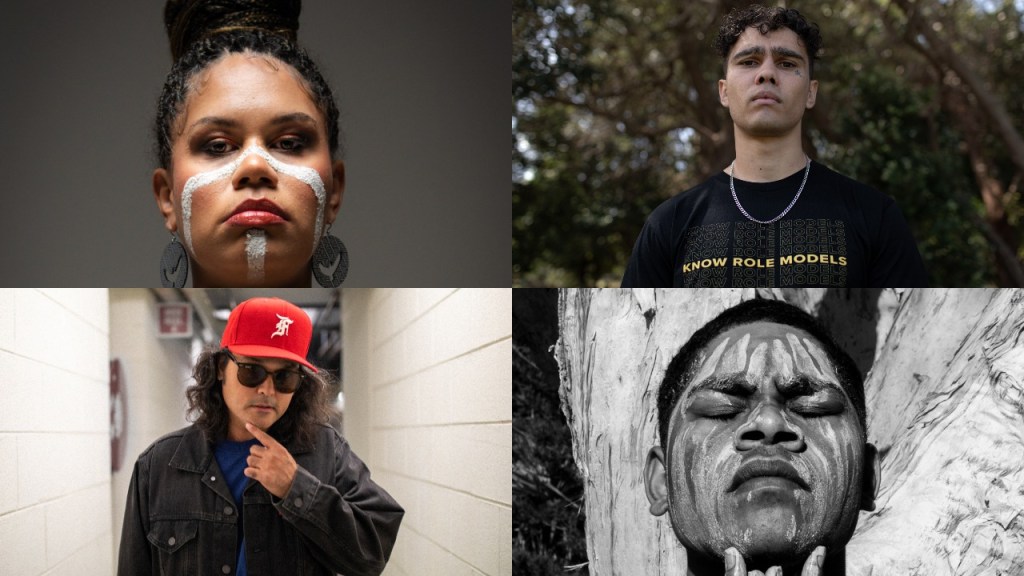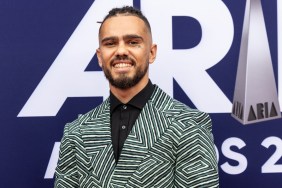Indigenous hip hop is nothing new, and nor does the term constitute a cohesive and culturally predetermined genre of music. But in the first few years of the 2020s, First Nations hip hop artists have been among the most significant voices shaping contemporary Australian pop culture.
Spotify Wrapped has given rise to a couple of new traditions in recent years. One involves the rife posting of listeners’ top played songs and artists on social media, and the other involves artists re-sharing the various lists they’re tagged in.
When Melbourne-based rapper and proud Butchulla man, Birdz, engaged in the latter tradition in December 2021, there was one re-post that stood out. Along with Birdz, this fan’s top played artists were all either Indigenous or African Australian hip hop performers, which led Spotify to deem their favourite genre “Australian hip hop”.
But this fan was displeased with the summary, and not because they disputed the artists’ claim to Australian nationality. Rather, while the history of Australian-made hip hop has been driven by diverse identities and political provocation, the genre tag “Aussie hip hop” still conjures images of white guys in cargo shorts spitting clunky double entendres and boasting of their capacious appetite for ice-cold lager.
By contrast, a lot of the most powerful, thought-provoking and generally excellent hip hop to ever come out of Australia is being made, right now, by artists like Birdz and his First Nations comrades, JK-47, Briggs, Barkaa, DRMNGNOW, Tasman Keith, Lady Lash and Kobie Dee.
Baker Boy – ‘Survive’ ft. Uncle Jack Charles
The Sydney-born pop/hip hop artist The Kid LAROI – whose stage name is a nod to his maternal Kamilaroi heritage – topped the US Billboard Hot 100 for four consecutive weeks in 2021. Gela, the long-awaited debut album from Baker Boy, fuses the artist’s native Yolŋu Matha with English, building on the immense potential of his first two singles, ‘Cloud 9’ and ‘Marryuna’, which made the triple j Hottest 100 in 2018.
Yorta Yorta MC Briggs is a veteran of politically-minded First Nations hip hop. Briggs’ single ‘Shadows’, released in October 2021, is one of the most explicit condemnations of the colonial project from an artist who’s never hidden his disdain for the racist establishment.
“They don’t wanna speak about the first battles,” raps Briggs, referring to white Australia’s continued failure to adequately acknowledge Australia’s Blak history. “Who the fuck are you to civilise?” he asks, eyeing off the perpetrators of brutal and sustained discrimination.
The song’s hook is performed by Troy Cassar-Daley, a Bundjalung and Gumbaynggirr man who’s one of Australia’s great country musicians. Briggs’ collab with a country artist is not a sign he’s softening up. In fact, Cassar-Daley delivers some of the song’s most painful lyrics: “Where my people were killed, I see shadows on the hill,” he sings.
The dynamism of ‘Shadows’ is nothing new for Briggs – he’s previously collaborated with everyone from Dr G. Yunupingu to Paul Kelly and Tim Minchin. In fact, Briggs’ resistance to commercial pigeonholing is an attribute shared by many of his contemporaries.
Briggs – ‘Shadows’ ft. Troy Cassar-Daley
Briggs runs the label Bad Apples Music, the roster of which includes Indigenous hip hop artists A.B. Original, Barkaa, Birdz, Kobie Dee and Nooky. Birdz released his second LP, Legacy, in November 2021, led by the politically salient singles ‘Bagi-la-m Bargan’ (feat. Fred Leone) and ‘Fly’ (feat. Ngaiire).
The album’s catchiest song, ‘Aussie Aussie’, is a merciless riposte to the concept of “Aussie” pride. “We just want our fucking land back,” goes the chorus. “We still living, they can’t stand that.” In a recent Twitter thread, Birdz described ‘Aussie Aussie’ as a comment on “Blak deaths in custody, police brutality, forced child removal” and the general erasure of “Blak voices.”
Barkaa, a Malyangapa Barkindji woman, is one of the country’s most direct and undeniable new voices. Her debut EP, Blak Matriarchy, is as unflinching as anything released by her First Nations peers and predecessors. Meanwhile, Barkaa’s audacious, teeth-baring flow is an effective instrument of protest in itself.
The EP’s standout track, ‘Bow Down’, opens with the disclaimer, “I ain’t come to beat around about the dispossession.” Later, Barkaa sheds light on the practices of the white dispossessors: “They used to beat ’em and then rape ’em and they took they kids.”
The song is suffused with respect for Barkaa’s matriarchal Elders, while also voicing solidarity with her First Nations sisters. “Salute to all my tiddas who is handling biz,” Barkaa raps. “We ain’t backing down to no patriarchal shit.”
Barkaa – ‘Blak Matriarchy’
The revolutionary potential of First Nations hip hop is on display in each of these releases from Barkaa, Birdz, Briggs and Baker Boy. The same applies to Kobie Dee’s EP, Gratitude Over Pity, and JK-47’s debut album, Made For This, which won Album of the Year at the National Indigenous Music Awards 2021.
After winning Best Hip Hop Act at the 2021 Music Victoria Awards, Yorta Yorta man DRMNGNOW wrote at length about hip hop’s intrinsic qualities.
“I dedicate this [award] to hip hop for being a vessel to inspire, to share story,” he wrote. “From a long way back, when me and my brothers and cousins watched rage back in the day here in [Shepparton] … to when I found NWA, Public Enemy, A Tribe Called Quest, then to Wu-Tang Clan listening sessions … that inspired me to write my first rhymes at age 13.”
He signed off by saying, “To even create songs is a gift.” Long may the gift of Indigenous hip hop continue to not just entertain, but also to promote community empowerment, anti-racism, Indigenous rights and wealth re-distribution.
Further Reading
A.B. Original Release ‘Yes’ Video: “The Alternative to Voting Yes Just Reinforces Racism”
Barkaa Withdraws From Sydney Festival Over Israeli Embassy Funding Partnership
Listen To Briggs’ New Track ‘Shadows’ With Troy Cassar-Daley












